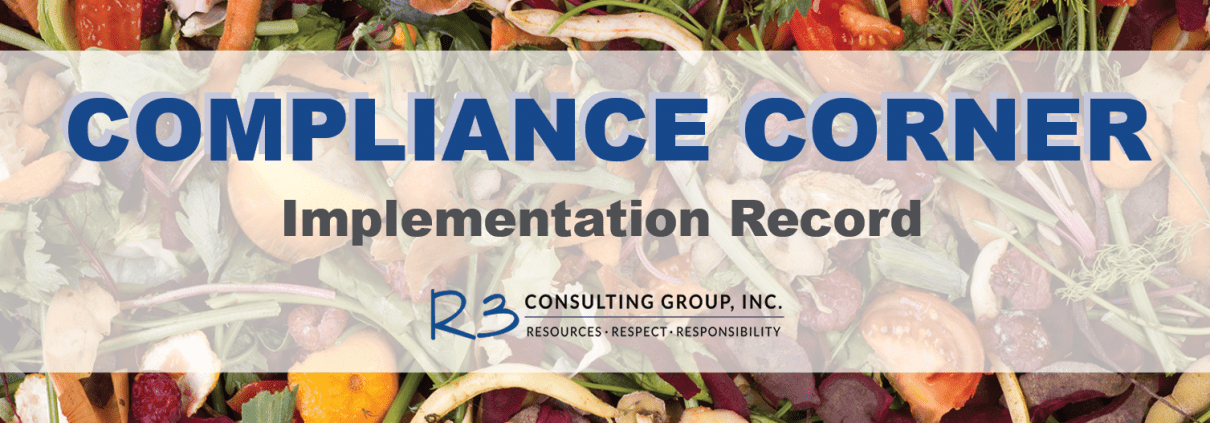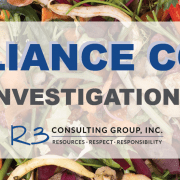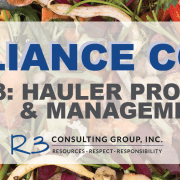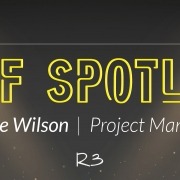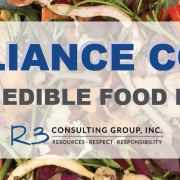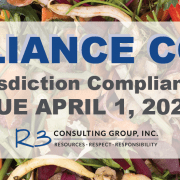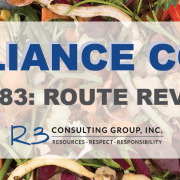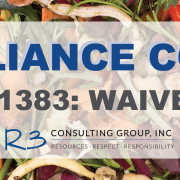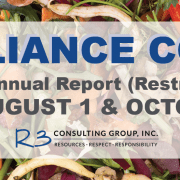Compliance Corner – March 2022 (3 of 3)
Are you ready for the Inspection and Recordkeeping requirements of SB 1383? Have you started the report for your jurisdiction due on April 1, 2022? And how is it different from the reports due August 1, 2022 and October 1, 2022? R3 is ready to help you get up to speed with inspections, recordkeeping, and reporting!
See below for more information regarding the Implementation Record and Inspection Requirements; see here for the Initial Jurisdiction Compliance Report due by Friday, April 1, 2022; and see here for the Jurisdiction Annual Reporting due August 1, 2022 and October 1, 2022 (and August 1 annually thereafter). Please don’t hesitate to reach out to the R3 team if you need further assistance!
March 2022 – Inspections and Recordkeeping
For this month, we’re looking at SB 1383 Inspections, Recordkeeping, and Reporting requirements, primarily focusing on three parts:
- Initial Jurisdiction Compliance Report
- Jurisdiction Annual Report (Restructured EAR)
- Implementation Record and Inspection Requirements
See below for some tips and guidelines that will help you through this ongoing process. Please remember to start tracking information in your Implementation Record now!
3. Implementation Record
Each jurisdiction should maintain all records required by SB 1383 using an Implementation Record, such as the Model Implementation Record Tool provided by CalRecycle. Records must be retained for five years and provided to CalRecycle within ten business days upon request.
The Implementation Record must include the following information:
- Ordinances and enforceable mechanisms
- Written program descriptions
- Organic waste service collection
- Contamination minimization, including route reviews and waste evaluations
- Waivers and exemptions
- Education and outreach
- Jurisdiction oversight of hauler programs
- Edible food recovery
- Recovered organic waste product procurement
- Paper procurement
- Inspection and enforcement
- Compliance reviews
- Investigation of complaints and alleged violations
Helpful Links:
- Model Implementation Record Tool
- Model Performance Implementation Record Tool
- Implementation Record Webinar Recording
- Implementation Record PowerPoint
Inspection Requirements
Each jurisdiction shall have an inspection and enforcement program designed to ensure overall compliance with SB 1383 regulations.
Inspections must include the following requirements:
- If the jurisdiction is using the compliance method with a two-container or three-container collection system, it shall complete a compliance review of all solid waste collection accounts for commercial businesses that generate two cubic yards or more per week of solid waste.
- The jurisdiction shall also determine compliance with organic waste generator requirements and self-haul requirements, including whether a business is complying through back-hauling organic waste.
- The jurisdiction shall either:
- Conduct annual route reviews of commercial businesses and residential generators for compliance with organic waste generator and container contamination requirements; or
- Perform waste evaluations to verify commercial businesses and residential generators compliance with organic waste generator requirements.
- If a jurisdiction is using the unsegregated single-container collection services compliance method, it shall conduct a compliance review of all solid waste collection accounts for commercial businesses that generate two cubic yards or more per week of solid waste, including organic waste.
- The jurisdiction shall also determine compliance with:
- Organic waste generator requirements and document if the business is transporting the contents to a high diversion organic waste processing facility; or
- Self-hauling requirements, including whether a business is complying through back-hauling organic waste.
- The jurisdiction shall also determine compliance with:
- Edible Food Recovery:
- Conduct inspections of Tier One commercial edible food generators and food recovery organizations and services
- Conduct inspections of Tier Two commercial edible food generators
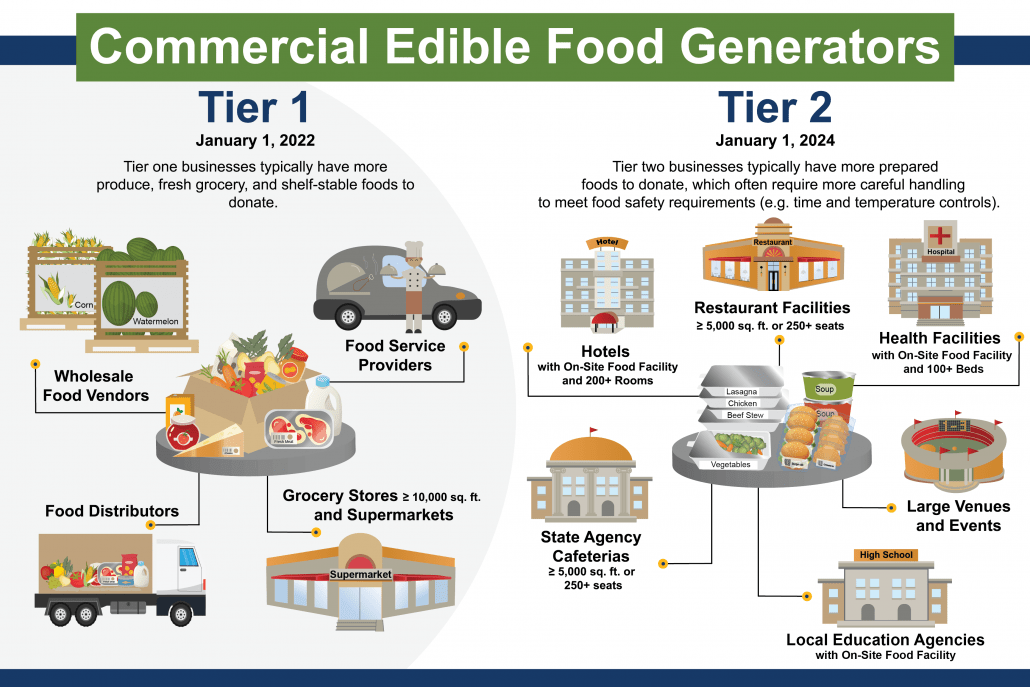
- Enforcement:
- Investigate complaints
- Enforce SB 1383 regulations in response to violations
- At least every five years from the date of issuance, verify through inspection that commercial businesses are meeting de minimis and physical space waivers for compliance
- Generate a written or electronic record for each inspection, route review, and compliance review conducted pursuant to this chapter, including at a minimum:
- Identifying information for the subject/subjects of the inspection, route review or compliance review, such as:
- Name/account name
- Description of hauler route and addresses covered by route review
- Addresses where prohibited contaminants were found
- List of accounts reviewed for each compliance review, the date/dates the inspection/review was conducted
- Person/persons conducted the action
- Findings regarding compliance and any NOVs or educational materials issued
- Any relevant evidence supporting the findings such as photos or account records
- Identifying information for the subject/subjects of the inspection, route review or compliance review, such as:
- Documents for route reviews, compliance reviews, and inspections, as well as all other enforcement, shall be maintained in the Implementation Record and shall include:
- Copies of all documentation
- Copies of all enforcement actions including NOVs and penalty orders
Other Helpful Links:
- https://www.calrecycle.ca.gov/organics/slcp/reporting
- Recordkeeping Tool for Self-Haulers
- Procurement Calculator Tool

